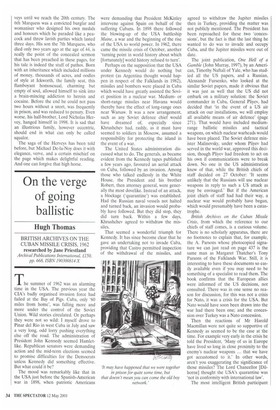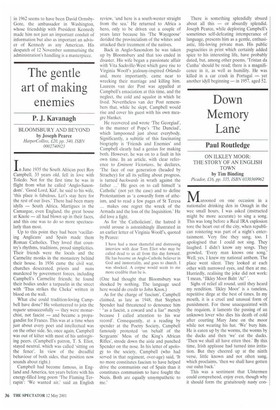On the verge of going ballistic
Hugh Thomas
BRITISH ARCHIVES ON THE CUBAN MISSILE CRISIS, 1962 researched by Jane Priestland
Archival Publications International, 1150, pp. 668, ISBN 190300814 X
The summer of 1962 was an alarming time in the USA, The previous year the CIA's badly organised invasion force had failed at the Bay of Pigs. Cuba, only '60 miles from home', was falling more and more under the control of the Soviet Union. Wild stories circulated. Or perhaps they were not so wild: I myself drove to Pinar del Rio in west Cuba in July and saw a very long, odd lorry pushing everything else off the road. The administration of President John Kennedy seemed Hamletlike. Republican senators were demanding action and the mid-term elections seemed to promise difficulties for the Democrats unless Kennedy did something effective. But what could it be?
The mood was remarkably like that in the USA just before the Spanish-American war in 1898, when patriotic Americans were demanding that President McKinley intervene against Spain on behalf of the suffering Cubans. In 1898 there followed the blowing-up of the USA battleship Maine, a war and the beginning of the rise of the USA to world power. In 1962, there came the missile crisis of October, another 'turning point in world history about which [fortunately world history refused to turn'.
Perhaps on the supposition that the USA under Kennedy would do nothing but protest (as Argentina thought would happen in respect of the Falklands in 1982), missiles and bombers were placed in Cuba which would have greatly assisted the Soviet position in a nuclear war. Mediumor short-range missiles near Havana would thereby have the effect of long-range ones near Warsaw. It was a new arrangement, such as any Soviet defence chief would have dreamed of, especially since Ithrushchev had, rashly, as it must have seemed to soldiers in Moscow, assumed a responsibility for protecting the island in the event of a war.
The United States administration discussed what to do. The generals, as became evident from the Kennedy tapes published a few years ago, favoured an aerial attack on Cuba, followed by an invasion. Among those who talked endlessly in the White House, the President and his brother Robert, then attorney general, were generally the most dovelike. Instead of an attack, a blockage ('quarantine') was established. Had the Russian naval vessels not halted and turned back, an invasion would probably have followed. But they did stop, they did turn back. Within a few days, Khrushchev agreed to withdraw the missiles.
That seemed a wonderful triumph for Kennedy. It has since become clear that he gave an undertaking not to invade Cuba, providing that Castro permitted inspection of the withdrawal of the missiles, and
agreed to withdraw the Jupiter missiles then in Turkey, providing the matter was not publicly mentioned. The President has been reproached for these two 'concessions', but the fact is that the last thing he wanted to do was to invade and occupy Cuba, and the Jupiter missiles were out of date.
The joint publication, One Hell of a Gamble (John Murray, 1997), by an American, Timothy Naftali of Yale, who has studied all the US papers, and a Russian, Alexsandr Fursenko, who looked at the similar Soviet papers, made it obvious that it was just as well that the US did not embark on a military solution: the Soviet commander in Cuba, General Pliyev, had decided that 'in the event of a US air attack on our installations, we will employ all available means of air defence' (page 271). That would have included mediumrange ballistic missiles and tactical weapons, on which nuclear warheads would have been placed. The Soviet defence minister Malinovsky, under whom Pliyev had served in the world war, approved this decision, though Pliyev had freedom to act on his own if communications were to break down. No one in the US administration knew of that, while the British chiefs of staff decided on 27 October: 'It seems unlikely that the Russians will use nuclear weapons in reply to such a US attack as may be envisaged.' But if the American joint chiefs of staff had had their way, a nuclear war would probably have begun, which would presumably have been a catastrophe.
British Archives on the Cuban Missile Crisis, from which the reference to our chiefs of staff comes, is a curious volume. There is no scholarly apparatus, there are no footnotes to explain that, for example, the A. Parsons whose photocopied signature we can just read on page 437 is the same man as Margaret Thatcher's Tony Parsons of the Falklands War. Still, it is interesting to have these documents so easily available even if you may need to be something of a specialist to read them. The book confirms that the European allies were informed of the US decisions, not consulted. There was in one sense no reason for discussion, for this was not a crisis for Nato, it was a crisis for the USA. But Nato would have soon been drawn into the war had there been one; and the concession over Turkey was a Nato concession.
Then the reactions of Mr Harold Macmillan were not quite so supportive of Kennedy as seemed to be the case at the time. For example very early in the crisis he told the President, 'Many of us in Europe have lived so long in close proximity to the enemy's nuclear weapons ... that we have got accustomed to it.' In other words, aren't you exaggerating the significance of those missiles? The Lord Chancellor [Dilhome] thought the USA's quarantine was 'not in conformity with international law'.
The most intelligent British participant in 1962 seems to have been David OrmsbyGore, the ambassador in Washington, whose friendship with President Kennedy made him not just an important conduit of information but also as important an adviser of Kennedy as any American. His despatch of 12 November summarising the administration's handling is a masterpiece.



































































 Previous page
Previous page